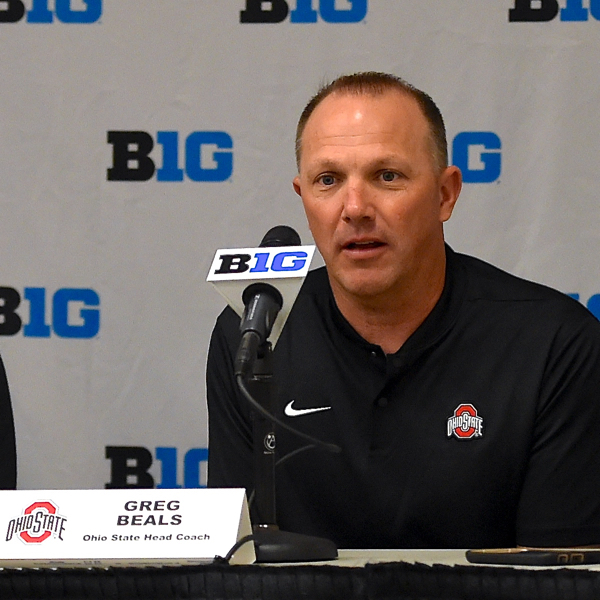Greg Beals has won 2 Big Ten tournament titles, has made it to NCAA Tournament 3 of last 4 seasons. But now, he wants even more out of his players.
(Ed. Note: In a three-part series on Ohio State baseball in 2019, our three Buckeye writers break down how far they came, and how far they have yet to go. Columnist Mark Znidar leads off with his thoughts in today’s post.)
Columbus – His baseball uniform was still sweaty and many thoughts were racing through the mind of Ohio State coach Greg Beals after a 10-5 loss to Indiana State in an elimination game in the NCAA Tournament.
One question he really wanted to duck as if it were a head-high fastball concerned next season. The hurt of seeing the season end was ten minutes fresh.
But Beals was on the dais behind a microphone and with a television camera rolling and he spit out some truth serum in public for his returning players to digest.

Veteran columnist Mark Znidar writes the Buckeyes for Press Pros Magazine.com.
The Buckeyes found themselves the final three weeks of the regular season in winning six of their last seven games, but still needed help in the form of Minnesota defeating Northwestern the final game just to get into the Big Ten Tournament.
Once in Omaha, they played lights out and with great heart to win the tournament with victories over Michigan, Maryland, Minnesota and finally Nebraska in the title game before 17,503 at TD Ameritrade Park.
Ohio State (36-27) was the No. 4 seed in the Nashville Regional, which is what teams get that have an RPI of 126. The result was a loss to Vanderbilt in the first round, a 13-inning victory over McNeese in the second and a loss to Indiana State in an elimination game.
With so many important players returning, the Buckeyes should be really good in 2020. Beals, though, said hold on one minute, if you please.
“I hate that you asked me about next year, but it’s obviously in the back of my head,’’ he said. “There is so much I’m looking forward to go to work on. There is so much. We’re not just going to run those guys out there next season. We’ve got to go to work in the fall and get better. We were in three of the last four national tournaments, but so what? We’ve got to get better.’’
Twelve of the 13 players who played in a NCAA Tournament for the first time will be back. The task for Beals and his staff is to make sure so many mistakes by the kids are not repeated.
Here are some of the things Beals & Co. want to find out:

Gotta throw strikes…Sophomore-to-be Seth Lonsway and freshman All-American led the Big Ten in strikeouts (126), but walked nearly half as many (56).
Can No. 2 starter Seth Lonsway begin throwing strikes consistently? When he is in the strike zone, batters tend to look foolish. But what looks to be a solid start sometimes comes undone with a loss of control.
Lonsway can no longer do what he did against McNeese, and that was to hit a batter with a 1-and-2 pitch in the third inning and then unravel when a couple of errors were made behind him.
He can be the best in the Big Ten with work, and there is no better work ethic on this team – no better 1-2 tandem, potentially than the pair of Lonsway and this year’s Friday starter, Garrett Burhenn.
As an example, Beals pointed to No. 3 starter Griffan Smith, a junior, for making rapid progress.
“I knew from the very beginning when I recruited Griffan Smith that he had the heart of a lion,’’ he said. “He has developed quite a bit as far as pitching goes. These last two weeks he has had an opportunity to show that. All year, he has pitched in some big ballgames for us. Down the stretch he kept giving us good starts.’’
Freshman reliever T.J. Brock had some hard to look at statistics such as a 9.00 earned run average and 11 walks and 31 hits in 23 innings. He gave up five runs in relief against Minnesota in the conference tournament, unable to protect an 8-1 lead.
Closer Andrew Magno turned pro, and pitchers such as Brock must take a great leap forward.
“All those guys on the mound, they have things to work on,’’ Beals said. “(Brock) is up to 93 miles per hour and has a pretty good tilt on his breaking ball, but he has to learn how to pitch better. That starts with his daily preparation.’’

Freshman Zach Dezenzo joined Lonsway with freshman All-American recognition.
The next player to be mentioned was freshman Zach Dezenzo. He was an answer to a prayer moving from third base to shortstop after a season-ending knee injury to Noah West after 19 games.
Dezenzo batted .250 with 10 home runs and 37 runs batted in, but struck out 81 times in 238 plate appearances.
“From an experience standpoint, yes, (he had a good season),’’ Beals said. “But Zach Dezenzo could be a better player. We’ve got to reduce his strikeouts.’’
No sooner had he finished talking about Dezenzo than Beals moved to freshman third baseman Nick Erwin. Erwin was exceptional defensively and moved runners over or scored them with eight sacrifices.
But the staff wants to see more. He hit .272 with 10 runs batted in and his on-base percentage was .287.
“Nick Erwin, the quality of his at bats has to continue to grow,’’ Beals said. “He plays a great third base for us.’’
Two players raised the level of their play to the point where they could be leaned on when games were on the line.
Sophomore catcher Dillon Dingler missed 19 games to have hand surgery and wasn’t 100 percent at any point when he returned, but he was stout defensively and batted .291 with three home runs and 19 runs batted in.
“One thing about this stretch run is that Dillon Dingler has been calling all the pitches,’’ Beals said. “We handed the game over to him to manage the game. He knows our pitching staff and he’s a great competitor. He has an idea of the sequences that we like to do and the philosophy that we have.’’

After missing 19 games with a hand injury sophomore Dillon Dingler caught fire to hit .290 and emerge as the best athlete on the field.
Here are more questions: Can second baseman Matt Carpenter put together consecutive quality seasons? Is first baseman Conner Pohl the home run machine that saw him hit five out of the park the final three weeks? Can West return from a second ACL surgery the same player? Who will close? Can another rising sophomore, Mitch Milheim, grasp the role of midweek starter?
Beals hopes a number of players become the next Brady Cherry. Cherry, a senior, was the second most important position player behind right fielder Dominic Canzone in batting .314 with 16 home runs and 52 runs batted in. He was second on the team with 30 walks and 47 runs scored.
“These younger guys need to mature a little bit as to how they go through their daily work,’’ he said. “They will be even better once they get (to that next level). They have to take some ownership. You’re not a freshman anymore. Know what you’re doing. Take the next step.’’

Good when it counts...The Buckeyes caught fire late to win the Big Ten tourney and return to the NCAA regional tournament. But they they need to be better, and Greg Beals has posted that challenge for 2020. (Press Pros Feature Photos)


